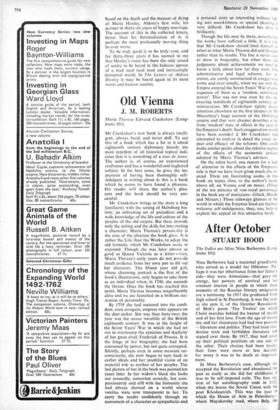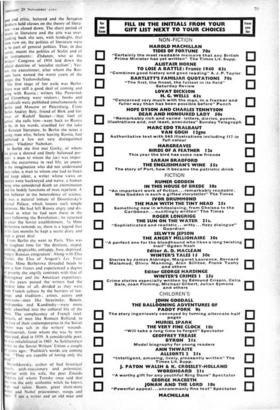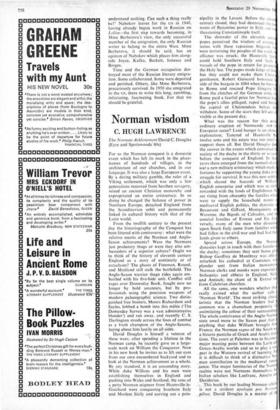After October
STUART HOOD
The Italics are Mine Nina Berberova (Long. mans 85s) Nina Berberova had a maternal grandfather who served as a model for Oblomov. Per- haps it was her inheritance from her father's side—they were Armenians—that gave her energy, her powers of survival and her constant interest in people to which these memoirs of the Russian literary emigration are a testimony. In 1917 she graduated from high school in St Petersburg; it was the year as she puts it, of the October Revolution, of Blok's poem 'The Twelve' (in which Christ marches behind the banner of revolt) and of her first love. From the age of twelve she and her classmates had had two passions —literature and politics. They had read clan- destine texts and forbidden literature and argued over them. By 1917, they had taken up their political positions on one side or the other. Their choices had been made; their fates were more or less decided; for many it was to be death or imprison• ment.
In Mme Berberova's case, although she accepted the Revolution and abandoned the past as easily as she did her childhood. it was to be self-imposed exile. The first sec- tion of her autobiography ends in 1922, when she leaves the Soviet Union with the poet Khodasevich. This was the year in which the House of Arts in Petersburg— where Mayakovsky read, where Bely, the Foe) and critic. lectured and the Serapion Brothers held classes on the theory of litera- ture—was closed down. The short period of Hoorn in literature and the arts was over. Looking back she sees, with hindsight, that from now on, the politics of literature were to be part of general politics. That, in due course, meant the politics of Stalin and of his instruments: Zhdanov, who at the Writers' Congress of 1934 laid down the official doctrine of 'socialist realism' ; Yez- hov. the executioner, after whom the Rus- sians have named the worst years of the purges the Yezhovshchina. The first stage of her exile was Berlin. There was still a good deal of coming and going with Russia ; writers like Pasternak and Ehrenburg were visitors; books and periodicals were published simultaneously in Berlin and Moscow or Petersburg. From Berlin Andrey Bely, friend of Blok and fol- lower of Rudolf Steiner—'that fool of 2enius' she calls him—went back -to Russia to be. in his words, crucified for the sake of Russian literature, In Berlin she notes a ,oung man who, before leaving Russia, had published a few not very distinguished poems: Vladimir Nabokov.
In Berlin she first met Gorky, of whom she gives" a shrewd and finely balanced por- trait: a man to whom the fact was impor- tant, the occurrence in real life, an enemy to the imagination who -did not understand fairy-tales, a man to whom one had to listen and keep silent, a writer whose views on poetics were hackneyed and naive, a hurhan being who considered death an abomination and the bodily functions of man repellent. A firm believer in the benevolence of science he was a natural inmate of Dostoievsky's Crystal Palace, which houses such simple optimists. He had left Russia angry and dis tressed at what he had seen there in the sears following the Revolution ; he returned to enter the Soviet establishment. .1s Mme Berberova reminds us, there is a legend that in his last months he kept a secret diary and wept a great deal.
From Berlin she went to Paris. This was the toughest time for 'the destitute, stupid. stinking, despicable, unhappy, base, deprived, angry Russian emigration'. Along with Elsa riolet, the Elsa of Aragon's Les Yeux Elsa, Mme Berberova threaded beads to am a few francs and experienced a degree f poverty she angrily contrasts with that of emingway and the American expatriates. As the years passed the writers had the ardent time of all, divided as they were rom French culture by the barriers of Ian- uage and tradition ; artists, actors and usicians—men like Stravinsky. Benois, Archipenko and Kandinsky—were more asily absorbed into the cultural life of the 'est. The complacency of French intel- tuals, of men like Romain Rolland, to he fate of their contemporaries in the Soviet nion was salt in the writers' wounds. hodasevich, from whom she was by now eparated, died in 1939. A considerable poet, e was rehabilitated in 1963. As Solzhenitsyn rote to the Soviet Writers' Union a couple
years ago: 'Pushkin's words are coming rue: "They are capable of loving only the ead•'.'
Mereshkovsky, author of bad historical ovels, arch-reactionary and polemicist, ogether with his wife, the poet Zinaida iPpius (of whom Trotsky once said that he Was the only authentic witch he knew), ePt sad salon. Bunin, great short-story titer and Nobel prizewinner, weeps and ays: `I am a writer and an old man and understand nothing. Can such a thing really be?' Nabokov leaves for the us in 1940, having already begun work in Russian on Lolita—the first step towards becoming, in Mme Berberova's view, the only successful member of the emigration, the only Russian writer to belong to the entire West. Mme Berberova, it should be said, has an opinion of Nabokov which places him along- side Joyce, Kafka, Beckett, Ionesco and Borges.
Time and the German occupation des- troyed most of the Russian literary emigra- tion. Some collaborated. Some were deported and perished. Others, like Mme Berberova, precariously survived. In 1950 she emigrated to the us, there to write this long, rambling, infuriating, fascinating book. For that we should be grateful.












































 Previous page
Previous page